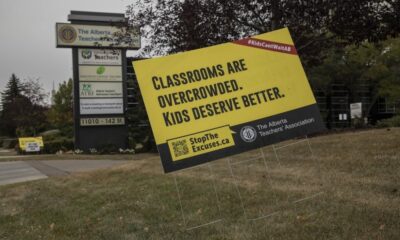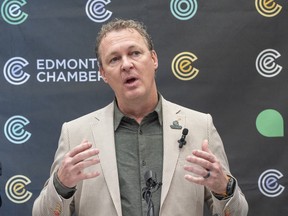Top Stories
UCP’s Election Strategy Fails in Alberta’s Major Municipalities

UPDATE: In a surprising turn of events, the United Conservative Party’s (UCP) strategy to influence municipal elections in Alberta has backfired. In Monday’s elections, the UCP’s favored candidates failed to secure mayoral positions in both Edmonton and Calgary, raising questions about the effectiveness of the party’s approach.
As results rolled in late Monday night, it became evident that independent candidates dominated the races. In Edmonton, Andrew Knack emerged victorious, defeating UCP-backed candidate Tim Cartmell and others to claim the mayor’s office. Knack, who previously served three terms as a city councillor, secured the win with a decisive rejection of party politics. “We saw a very clear rejection of party politics in Edmonton,” Knack stated shortly after his victory.
In Calgary, UCP’s attempt to push out incumbent mayor Jyoti Gondek also fell flat. Former councillor Jeromy Farkas, who ran independently, edged out UCP-supported candidate Sonya Sharp with a narrow margin of 75,123 votes to 73,957 votes. Sharp has already requested a recount, highlighting the tight competition.
This election cycle was marked by controversy, driven by the UCP’s legislation allowing significant corporate contributions and the introduction of party politics into municipal races. The UCP’s intentions were clear: to streamline the election process for candidates aligned with their ideology. However, the results signal a backlash from voters who seemed to favor independent and progressive candidates instead.
The municipal affairs minister at the time, Ric McIver, claimed the legislation aimed to enhance “accountability, transparency, and public trust” in local elections. Ironically, the outcomes of these elections may suggest the opposite—an actual enhancement of public engagement against the backdrop of UCP’s influence.
In Edmonton, independent candidates won eight out of twelve council seats, significantly diminishing the UCP’s presence. Meanwhile, in Calgary, the MAGA-aligned operators who targeted Gondek’s administration now face a new challenge with Farkas, who may not align entirely with their agenda.
The long vote counting process, exacerbated by the UCP’s insistence on scrapping electronic tabulation, raised frustrations among voters and likely contributed to lower turnout rates across the province. Many residents are now left questioning the effectiveness of UCP’s strategies in light of this electoral outcome.
With the Legislative Assembly set to resume on July 15, 2023, many Albertans are eager to see how the UCP will respond to this electoral defeat and whether the opposition, particularly the NDP, will capitalize on this momentum.
As the dust settles, Alberta’s political landscape appears poised for significant changes. This election serves as a critical reminder of the power of local governance and the importance of voter engagement in shaping community leadership.
Stay tuned for further updates as more election results are finalized and implications of these outcomes unfold.
-

 World3 months ago
World3 months agoScientists Unearth Ancient Antarctic Ice to Unlock Climate Secrets
-

 Entertainment3 months ago
Entertainment3 months agoTrump and McCormick to Announce $70 Billion Energy Investments
-

 Lifestyle3 months ago
Lifestyle3 months agoTransLink Launches Food Truck Program to Boost Revenue in Vancouver
-

 Science3 months ago
Science3 months agoFour Astronauts Return to Earth After International Space Station Mission
-

 Technology2 months ago
Technology2 months agoApple Notes Enhances Functionality with Markdown Support in macOS 26
-

 Top Stories2 weeks ago
Top Stories2 weeks agoUrgent Update: Fatal Crash on Highway 99 Claims Life of Pitt Meadows Man
-

 Sports3 months ago
Sports3 months agoSearch Underway for Missing Hunter Amid Hokkaido Bear Emergency
-

 Politics3 months ago
Politics3 months agoUkrainian Tennis Star Elina Svitolina Faces Death Threats Online
-

 Technology3 months ago
Technology3 months agoFrosthaven Launches Early Access on July 31, 2025
-

 Politics3 months ago
Politics3 months agoCarney Engages First Nations Leaders at Development Law Summit
-

 Entertainment3 months ago
Entertainment3 months agoCalgary Theatre Troupe Revives Magic at Winnipeg Fringe Festival
-

 Politics2 weeks ago
Politics2 weeks agoShutdown Reflects Democratic Struggles Amid Economic Concerns




















